Office of IDEAS
Faculty Stories
The Office of IDEAS has launched a new video series telling faculty and student stories of innovation, collaboration and impact. "Faculty Stories" aims to highlight the unique challenges and solutions discovered by faculty in 2023 and beyond.
Dr. Caio Sarmento was faced with a unique challenge during the COVID-19 interruption: how do you teach a hands-on physical therapy course while being hands-off? He found greater student success with a hybrid solution that he still uses today.
Previous Stories
Our collection of past faculty stories.
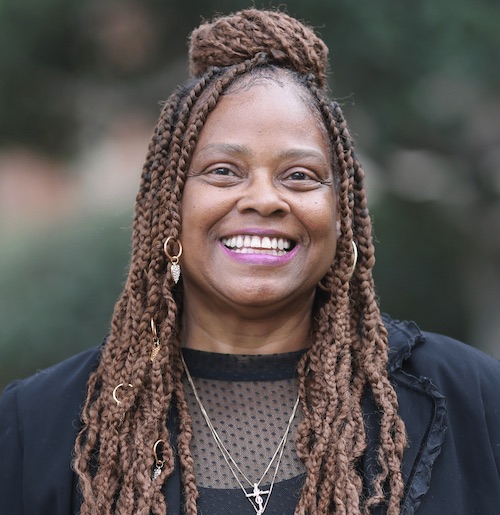
Dr. Marvita Gowdy is an Africana Studies Lecturer for the CSUF Social Science Department, and an English Instructor for Fresno City College. She is also the recipient of SCCCD 2022 Honor Wall Award. Dr. Gowdy was born in Chicago, Illinois and later moved to California with her husband Kenneth Gowdy. Together, they have one daughter, Kennetra Gowdy, a special education teacher. In their spear time, they love traveling and exploring how others live. Dr. Gowdy is always ready for a good adventure, and a fun fact about her is that she made an appearance on the Wheel of Fortune.
You may also find her name on CSUF Teacher's Honor Wall. Dr. Gowdy’s professional career started in the legal field where she worked for Fresno City Attorney’s office during the day, and she was a college student at night. After a few years of dedication and perseverance, her career blossomed from a paralegal to an English professor. She has over 20 years’ experience as a higher education professor, and she enjoys helping others achieve their goals. She draws inspiration from her Lord and savior, Jesus Christ and gives credit to her mentor, the late great Dr. James E. Walton for paving the way.
What is one teaching tip that you would like to share with your colleagues or with your younger self?
One teaching tip she would like to share with her colleagues is to communicate with your students. Be intrusive by asking the important questions when something seems out of the ordinary. Check on them when they miss class or an assignment. Send little, short notes to let them know that they missed an assignment, or if you noticed they were not in class. Ask if there is something you can do to help. She said, we must retain them while they are in our care, and what better way than to show that you care than to show humanity. Our students have gone through so much these last few years, so it is imperative that we reach out to them. It doesn’t cost a penny to show kindness and compassion to others. It is free.
How has the Office of IDEAS impacted your teaching?
Dr. Gowdy agrees that the Office of IDEAS has had a huge impacted on her teaching. She started working with the department over 20 years ago, and she has Instructional Designer Mary Bennett to thank for taking her under her wings. Mary helped her design and develop synchronous and asynchronous classes in 2012, and she fell in love with the concept and has been an online instructor since the onset of her training. She learned how to implement technology for her benefit as well as the student’s.
Since she enjoys using technology to enhance and innovate traditional instructions, she signs up for whatever training she can fit in her schedule. She loves working with the office of IDEAS because they offer courses to keep instructors up to date with the newest technology and teaching methods. She finds joy in learning and sharing knowledge, and she is a facilitator for the Office of IDEAS; therefore, don’t be surprised if you are in one of her DISCOVERe courses. It would be a true honor having you.
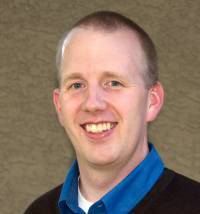
I am an Associate Professor of Biology, and I enjoy teaching so much that I have been involved in helping teachers learn how to teach since 2014, when I was nominated to be part of the inaugural cohort of DISCOVERe faculty fellows. I have since led faculty cohorts in the CSU Course Redesign with Technology program, in the ACUE Effective Online Teaching Practices course, and in Fresno State’s Flexible Course Institute. As an Apple Distinguished Educator, I also enjoy integrating new technologies and educational practices, and I conduct ongoing human subject research studies to monitor the effects of technological interventions on student success. I'm a member of the CSUCCESS Assessment Committee, and my latest challenge has been teaching HyFlex classes and embracing the opportunity to allow students to decide whether to attend class in-person or using Zoom. In the increasingly rare times that I'm not focusing on teaching, I also lead a research group in evolutionary genetics. My NIH-funded research program, which involves undergraduate and graduate students, has focused on understanding how differences in DNA sequences in parents can cause their children to be less healthy. We conduct these experiments using a well-studied species of worm that is really amenable to research in the academic lab setting. For example, they're really hard to kill by accidental starvation, and we can store them in liquid nitrogen and revive them years later for continued use. I'm also interested in improving the methods that academics use to teach research ethics to budding scientists, and I conduct research to understand how instructional interventions can be better designed to improve the probability that students will act ethically when faced with situations that require ethical decision-making (e.g. plagiarism, proper and improper methods of data analysis, acceptable and unacceptable methods of image manipulation). One of my other passions is photograph and graphic design. An aspect of being a professor that I really enjoy is helping students and my faculty and staff peers become better communicators using visual imagery. So, I incorporate these elements into my courses, and I occasionally host workshops to help others learn to use the Adobe Creative Cloud suite (e.g. Photoshop, Illustrator, InDesign) to create engaging and effective infographics and course materials.
What is one teaching tip that you would like to share with your colleagues or with your younger self?
If I could use this platform to convince others to make a single change in their practice of teaching, then that change would be for all of us to become more willing to fail at something in front of our students, and then to use that as an opportunity to demonstrate resilience and to demonstrate how to learn. It is so powerful to show our students that we teachers are not perfect and that we don't always know the answers, but that we're good at knowing how to find the answers and that we want to show them how to do that!
How has the Office of IDEAS impacted your teaching?
The Center for Faculty Excellence has been instrumental in my professional development over the ten years I've been on the Fresno State faculty. As has been historically typical for science PhDs, I had very little exposure to teaching during my doctoral and post-doctoral training periods. The first class I taught from start to finish was in my first semester here as an Assistant Professor. I credit CFE with supporting all of my growth as an educator, particularly through the professional development events they host. I've been a part of Faculty Learning Communities, I've attended the annual Technology, Inclusion and Pedagogy (TIP) conferences, and I've been blessed over the years to work more and more closely with the CFE staff to learn more. It is a privilege to be able to continue helping support CFE in their mission to promote and enhance effective instruction for our students.
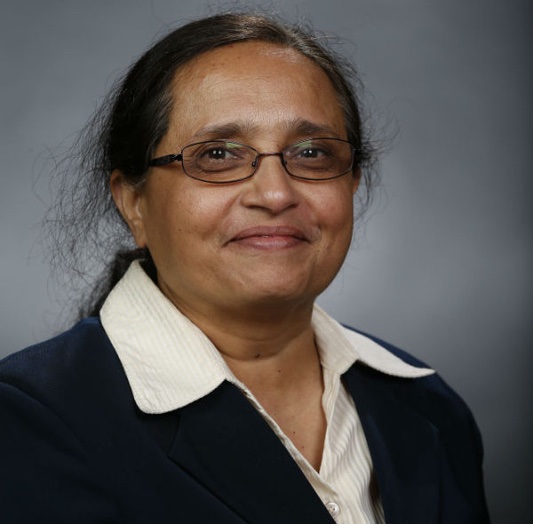
I am Lalita Oka (my last name is pronounced as ‘Oak’ in my language). I am really pleased to share my journey thus far. I am born in raised in a small town named Wardha in the central, rural part of India. I completed my B.S. and M.S. in India from the University of Mumbai as a part-time student while working full-time in a privately owned civil engineering company and eventually became engineering director of the company. My supervisor was one of the few women consulting engineers in India and inspired me in my career. I came to the United States of America in 2004 to pursue my PhD in University of Vermont (UVM). After working for a year as a visiting professor at Bucknell University, PA and a year as a postdoc at UVM, I moved to Fresno in 2013 to teach at Fresno State’s Lyles College of Engineering and have been teaching mostly upper division and graduate classes in Geotechnical Engineering discipline in the department of Civil and Geomatics Engineering. My research interests are in the Geotechnical Engineering – a study area that focuses on soils as a material that supports foundations, retaining walls, highways, dams and many other civil engineering structures. My specialization is in experimental and numerical modeling and liquefaction susceptibility of soils. I am also passionate about the success of women in engineering field. I am very proud to be a part of a team to receive a $1.25 million grant from NSF titled "Kindling Inter-university Networks for Diverse (KIND) Engineering Faculty Advancement in the California State University System.” where in we have partnered with three CSUs (SJSU, Cal State LA, Cal-Poly SLO) to bring about systemic change to increase ad retain women faculty in the engineering colleges across CSU system.
What is one teaching tip that you would like to share with your colleagues or with your younger self?
Many STEM faculty come to United States as an international student. The education system, especially the undergraduate degree in the US is different. When I entered the academia, I struggled a lot to understand how this system works. Coming from a very traditional (blackboard-chalk) classroom, teaching with PowerPoint slides was a big challenge for me and have never been exposed to any pedagogical methods in engineering classrooms. My initial years went in creating PowerPoint slides for my classes until I realized this is just ‘a’ method and not ‘the’ method. Students learn in multiple ways and can succeed in class provided instructor knows what is/are ‘Learning Objectives’ for the topic covered in the class. Since then, I started backward-designing of my class notes / topic and I use multiple methods to teach. So, my tip for new faculty especially in STEM is to plan multiple 10-12 minutes of discussion and/or problem solving activities in each lecture. I cover two-three specific learning objectives related to the topic each day and break it down to 5-6 time slots. Then think of which method will work the best for that topic. It could be using props in the class, using PowerPoint slides, using document camera… whatever you think will work the best. That way I am able to keep students attention focused on the topic of the day or bring back their attention quickly. The lesson I have learned is that, a key factor in student success is to keep them engaged rather than teaching all the topics you wish to cover. I remind myself every day that my role is to ‘facilitate learning’ and not to ‘teach’!
How has the Office of IDEAS impacted your teaching?
Coming from engineering background, I always felt the need to train myself into various pedagogical technics to make my lectures more effective. The Center of Faculty Excellence (CFE) was always there to help me out. I have been a regular participant in many initiatives of CFE, for example, Discover-e faculty training, Course Redesign with Technology (CRT) training from the CSU Chancellor’s Office, Affordable Learning Solutions fellow etc. The most memorable help from CFE’s came during COVID-19 pandemic. I cannot thank the CFE enough for proving all kinds of help from setting up Zoom classrooms, integrating course into Canvas, Video capturing, editing and so on… the list is very long. I am currently teaching a HyFlex course and also one of the faculty facilitators for HyFlex faculty learning community for the Fall 2021. I believe that some pedagogical technics that I learned during COVID-19 pandemic will stay even after we resume to in person classes in future.
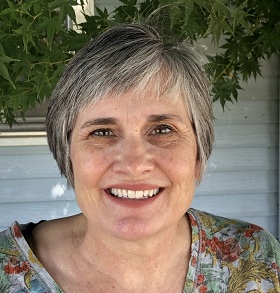
Natalie earned her BA in French at Fresno State and left to pursue her MA and Ph.D. in French at University of California, Los Angeles (UCLA). Natalie discovered her passion for the French language when she was an exchange student in high school and got the opportunity to spend time in France. Upon coming back to her hometown of Fresno she wanted to continue learning the language.
What is one teaching tip that you would like to share with your colleagues or with your younger self?
Flexibility for students. “I was not going to join HyFlex at first, but after a few of my students expressed scheduling challenges I asked them what they would think about the model.” Natalie’s students had scheduling conflicts with jobs or the commute between job and school was complicated. When Natalie informed them of HyFlex the students saw a solution to both permanent and temporary time conflicts that would normally prevent them from taking certain courses.
Natalie’s HyFlex courses have been great for students who have had life come up where they cannot make it to class. Natalie still uses group work, presentations, and elements of the traditional classroom with the flexibility for students to engage from home. Natalie also integrates things like learner surveys, flexible assessments, and other forms of flexible pedagogy.
Natalie and her students made the decision to have online exams which allows them to use the class session for exam reviews. Due to factors like weather, illness, or schedule changes students who normally attend in person have been able to join via Zoom. Natalie recommends faculty to learn how to utilize HyFlex for a more flexible and equitable learning experience for students.
Has the Center for Faculty Excellence (CFE) helped to better your teaching and learning to engage students for success? If so, how?
Natalie facilitated training for other faculty on HyFlex through the Center for Faculty Excellence and felt she learned a lot from those she was training. She saw her colleagues brainstorm flexible practices that made for a better learning experience and made additional changes to her own courses. One thing that Natalie recommends for other faculty is to engage in HyFlex instruction with the purpose of it being different from in-person and different from online. Natalie believes HyFlex is its own experience and has its own benefits and challenges. The Center for Faculty Excellence offers Learning Communities for HyFlex instruction.
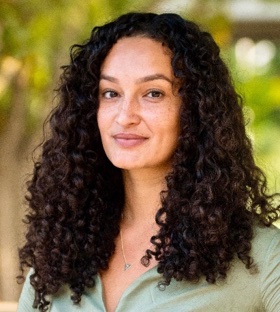
I am a daughter of immigrants from Nayarit, Mexico who grew up in Los Angeles. Soon after graduating from UCLA, I moved to New York City where I taught in NYC public schools while working on my M.A. in TESOL at Pace University. I eventually decided to pursue a Ph.D. to work with pre-service teachers in an effort to increase my impact on P-12 education. In 2017, I graduated with my Ph.D. in Urban Education from The Graduate Center of the City University of New York, and soon after, I moved back to California with my young son Remi to accept a faculty position here at Fresno State.
My teaching and research centers culturally and linguistically sustaining approaches to teaching emergent bilinguals, translanguaging, critical pedagogies, and bilingual education policy.
My co-authored book, En Comunidad: Lessons for Centering the Voices and Experiences of Bilingual Latinx Students (Heinemann), is out February 25, 2020.
Find me on Twitter @Dra_LuzYadira
What is one teaching tip you would like to share with your colleagues or your younger
self?
Be a co-learner. Be open to the fresh perspectives and approaches students often
bring.
Has CFE helped to better your teaching and learning to engage students for success?
If so, how?
CFE has created critical spaces for me to continuously rethink my pedagogical approaches.
And to explore the transformative ways that technology can amplify both learning and
instruction.
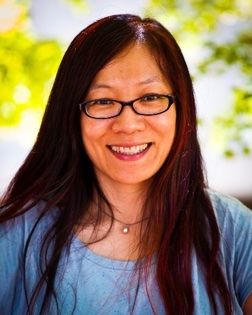
I am an Associate Professor of Agricultural Business in the Jordan College of Agricultural Science and Technology. A native of China, I earned my M.S. in Applied Economics from University of Alaska, Fairbanks (2004) and Ph.D. in Agricultural Economics from Purdue University (2007). After spending four years teaching agricultural economics courses in New York State University, I moved to Fresno in 2011 and have taught various courses including agribusiness accounting management, international economics, advanced agribusiness application and agribusiness management. In May of 2019, Fresno State’s Jan & Bud Richter Center for Community Engagement and Service-Learning joined the City of Fresno to name me as their Outstanding Service-learning Faculty for my leadership in the application of service learning in the teaching of agribusiness courses. I was also the recipient of the university’s Promising New Faculty award in 2015. I enjoy conducting academic research and have published 43 journal articles which focus on the analysis of consumer price acceptance of food and agribusiness management strategies. I’ve received research grants from United State Department of Agriculture’s Agricultural Marketing Service, California State University’s Agricultural Research Institute, and the university’s Gazarian Real Estate Center.
I participated in the 2016 DISCOVERe summer camp and have converted all of my courses into tablet courses. In the classroom, students use Nearpod, a student engagement platform, to solve quiz problems and share opinions on discussion topics. Outside of the classroom, students use interactive tutorials with immediate feedback to build graphs that present their understanding about economic principles behind the curves. The application of technology enhances the learning of agribusiness economics principles and allows instant interaction between the instructor and students.
CFE is of great help on my teaching and research. I have conducted semester-based students opinion surveys and CFE has assisted me each and every semester with data collection on Qualtrics. In the summer of 2018, CFE funded my research to analyze the impact of DISCOVERe mobile technology on agribusiness learning which resulted in one research publication in International Journal of Technology Enhanced Learning. The great resource offered by CFE makes my teaching and research more effective and the learning of my students more enjoyable.
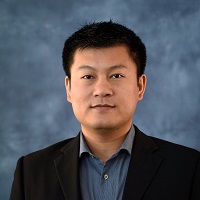
I am an Associate Professor from the Department of Construction Management in Lyles College of Engineering. I received my Bachelor of Engineering in Built Environment and Equipment Engineering from Hunan University in China in 2004, Master of Science in Environmental Change and Management from University of Oxford in the UK in 2005, and Doctor of Philosophy in Design, Construction and Planning from University of Florida in 2010. I teach courses on topics including construction graphics, design-build project delivery, building information modeling (BIM), architectural design problems and senior capstone. I was awarded the Teaching Excellence Award by the Associated Schools of Construction, Region 7 in 2018. My research interests include BIM, graphics and visualization, virtual and mixed reality, green building and sustainable construction, workforce development, cyberlearning and educational technology, as well as construction and engineering education. I have published more than 50 peer-reviewed journal articles and conference proceedings in these areas. My research has been funded by regional and federal agencies including a recent National Science Foundation (NSF) grant on investigating Mixed Reality (MR) for career-specific competency cultivation among construction management and engineering students. I received the Provost's Award in Innovation of Fresno State in 2019 for my efforts in leveraging technology for better student learning. Currently I am also running a Digital Building & Integration Lab (DBI-L) and mentoring a student club named Digital Innovation & Research (DIR), which aims to promote digital literacy and student entrepreneurship.
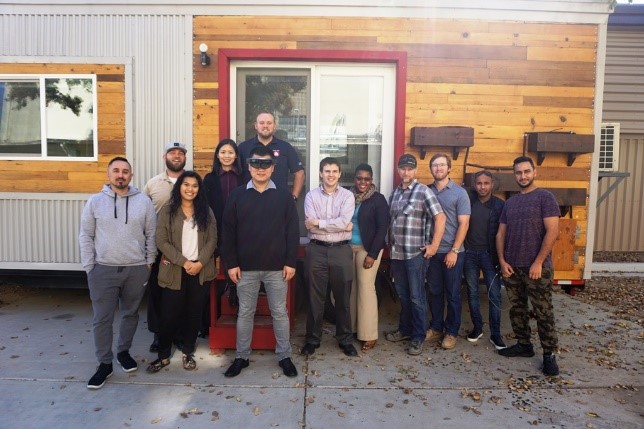
Due to the nature of my teaching and research interests, I tend to use a lot of technology in classroom. However, I find it even more important to integrate technology with active learning strategies, such as project-based learning and service-learning. I've always been trying to balance the technical and social-emotional constructs in my pedagogy, and strive to develop students' soft skills (e.g. communication. leadership, critical thinking, collaboration) as well as discipline-specific technical skills.
I've been helped by CFE in various occasions, from the DISCOVERe summer camp, the online teaching boot camp, to course redesign for better assessment, as well as other pedagogical training workshops over the years. CFE at Fresno State is a great resource to all faculty when it comes to better learning and teaching.
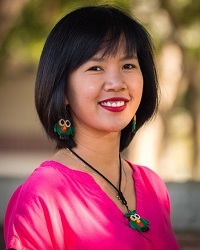
Trang earned her MA in English as a Second Language at UT Pans American (now UTRGV) and her Ph.D. in Learning Design and Technology at the University of Houston. Born, raised and went to college in Vietnam and later worked at 3 different HSIs in the U.S, Trang's academic career has revolved around multilingualism and diversity. Her teaching, research and services have included culturally, linguistically and economically diverse groups of students.
At Fresno State, Trang teaches required credential courses in technology for both the elementary and secondary students, as well as graduate level courses in the Curriculum and Instruction Masters. She's also an affiliated faculty member in the Doctoral Educational Leadership program at Kremen School.
Trang's research background strictly involves diversity and is service-oriented towards the underrepresented. Her Master’s thesis examined the effects of graphic organizers on reading comprehension of native speakers of English, Spanish-speaking Generation 1.5 and ESL learners subgroups. During her Ph.D, she co-designed professional development (PD) Massive Open Online Courses (MOOCs) for Texas K-12 teachers and global audience and developed her research agenda on this area. At Fresno State, she was one of the representatives of Fresno State in their partnership with Microsoft and Fresno Unified School District (FUSD) in the Personalized Learning Initiative (PLI) in 2017. Trang participated in various PD trainings organized by CFE including eScholars, DISCOVERe, Summer Academy, and Graduate Online Mentoring workshop, to name a few. Most recently, she collaborated with her colleagues at College of Engineering and submitted a $1.5M NSF DTI R&D grant on developing, testing and assessing a technology-enhanced and community-engaged experiential learning program to strengthen learning opportunities and promote STEM careers for underserved high school students in the Central California.
Trang serves in a number of technology-oriented committees at the university level due to her Directorship at INTERESC. She also organized NASA educational workshops for pre- and in-service teachers at Fresno State and in Fresno county. In 2017, Trang won a mini grant from the Continuing & Global Education to recruit international graduate students from Vietnam.
A link to one of the videos about teaching and learning at Kremen school: https://youtu.be/AeoJK8mx1zo
I do believe in the power of empathy which translates into both emotional concerns and acts on students' needs, as well as cognitive/perspective taking: adopt their point of view on a daily basis. I want my students to experience ambiguity, confront failure, accept constructive criticism, ask the right questions, and develop an understanding and a sense of empathy for the users when they design a product for them. I have been practicing this in my classes, write about it, and want to continue doing it and improving on it. Together with encouraging students' meaningful uses of technology, this is my lens to student-centered learning practice in my class.
CFE has influenced my teaching practice in so many positive ways from organizing the aforementioned useful workshops and training to informal sharing and being always available for support. I love the collegiality built with the CFE instructional designers and director.
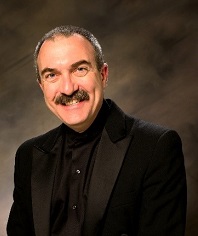
I grew up in Lancaster, PA, the Pennsylvania Dutch country where we shared the road with the Amish folks in their buggies. My childhood dream was to become a band director and perhaps even compose band music some day. I started my career as a high school band director and after 14 years of that I was hired at Fresno State to restart and rebuild the Bulldog Marching Band as the Associate Director of Bands. I loved doing that for 13 years and then won the national search for the Director of Bands position and am currently starting my 14th year performing those duties. I have over 200 publications of my compositions and arrangements for a variety of bands and ensembles. Two years ago and former conducting student of mine, Christine Keenan and I started a new group in town that is a semi-professional wind band called the Wind Symphony of Clovis. This group consists of many Fresno State alums and it is a gas to be one of their conductors. After just six months as a band we applied to perform at the world's most prestigious band director's conference and were selected to be featured at the event in Chicago. Conducting that concert last December was certainly one of the proudest moments of my life. I have been married for 37 years and have two grown children with my first grandchild on the way. My biggest hobby is going up into the Sierras and cutting/splitting firewood. It is an intense work out.
What is one teaching tip that you would like to share with your colleagues or with
your younger self?
The more energy you share with your students the more you get back from them!
Has the Center for Faculty Excellence (CFE) helped to better your teaching and learning
to engage students for success? If so, how?
Absolutely! There are SO MANY new things to learn. I think we ALL know that we all
need to be life-long learners but that is FAR MORE true today as the world of technology
provides us with so many awesome new options to help people learn and understand.
The folks in CFE have been VERY patient and kind with me and I appreciate it VERY
much. Although I am still quite a novice, I have managed to work LOTS of technology
into my teaching and I know I am more effective than I would be without the knowledge
I have gained through CFE.
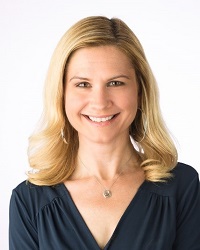
Born and raised in Fresno, CA, Clare received her M.A. in Communication Theory from Fresno State. She is an Instructor of both Journalism and Communication Arts at Fresno State and Fresno City College. Her teaching interests center around nurturing student success by providing a strong learning environment that meets the needs of a diverse student population using innovative technology practices in the classroom. She is certified to teach online classes for both the CSU and California Community College systems, has done work as a trainer/super user during Canvas Week, and was a featured faculty presenter for the Technology Innovations & Pedagogy for the Center for Faculty Excellence at Fresno State.
One teaching tip that inspires her was the idea of being an "early adopter" for developing technology in the classroom. This keeps teaching current and makes teaching more fun. The people involved in innovating practices are also very helpful and nice to be around making the workplace more enjoyable.
She definitely agrees that the Center for Faculty Excellence (CFE) has helped better her teaching so that students are more engaged and successful. She teaches DISCOVERe classes and has been creating rich content on Canvas using different technology-based methods. She uses a "Project-based Learning" model in the classroom and has guided over 20 students to present their first-year university research on critical/cultural Communication theories to the community and to students from other disciplines at the first annual High Impact Practices Student Research Symposium at Fresno State. She was an early adopter for the Immediate Access program at Fresno State and has integrated publisher-based content with LaunchPad and Connect in her classroom, as well.
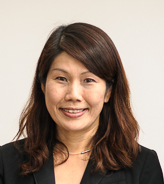
Dr. Yoshiko Takahashi is an Associate Professor in the Department of Criminology. While teaching undergraduate and graduate courses, she coordinates the Victimology Option program and oversees the Victim Services Certificate program. Dr. Takahashi earned a Ph.D. in public policy, with an emphasis in criminal justice, from the University of North Carolina at Charlotte. Previously, she worked as a management analyst in the Sheriff’s Office in Mecklenburg County, North Carolina. Her current research focuses on domestic violence and gender inequality issues among Asian communities in the United States and Southeast Asian student success in higher education. Her book, Victimology and Victim Assistance: Advocacy, Intervention and Restoration was published from Sage in December 2018. Dr. Takahashi is engaged in the local community but also active internationally. She is serving on the Board of Directors of the Central California Asian Pacific Women (CCAPW) in Fresno. She was elected to the Executive Committee of the World Society of Victimology (WSV) in 2015 and became the vice president in 2018.
Dr. Takahashi was born and raised in Kochi, Japan, which is a sister city of Fresno. Kochi is known for its affluent rich nature, agricultural, and fishing products but also has a popular summer festival, Yosakoi, which is one of the 10 largest festivals in Japan. She retains strong ties to her hometown and meets and greets delegates from Kochi who visit Fresno. Also, she is currently working with pro bono lawyers and victim advocates in Kochi to create crime victim protection laws there.
The best moments of her career include a trip to Hong Kong with her students. Dr. Takahashi and her colleagues took 13 students to the 16th International Symposium of the World Society of Victimology 2018 in conjunction with a faculty-led study-abroad program in June 2018. Most of the students visited a foreign county for the first time and noted that the program was a memorable learning experience. One student noted that her experience with the international conference made her rethink that “We are privileged to live in country where we enjoy a large degree of safety relative to communities across other war-torn, corrupt countries. With this privilege, we must continue to work in pursuit of securing crime victims’ rights across the globe.”
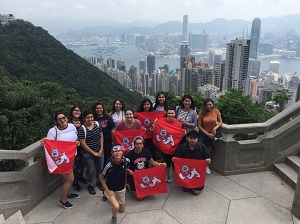
One teaching tip from me is to be proactive with reaching out to the students. My research on Hmong college students indicated that Hmong students did not significantly differ in their academic progress, but their perceptions of graduating in 4 or 6 years are significantly lower than other students who share a similar background. For these reasons, Hmong students feel they are responsible to support their parents and siblings. Also, those Hmong students lack a sense of belonging and feel that are not getting support from the school. As an instructor, cultural knowledge in the classroom and culturally sensitive pedagogy would help many students who struggle in balancing home responsibilities and academic success.
The Center for Faculty Excellence (CFE) is an amazing resource for faculty. I was able to learn so many technologies and new skills through DISCOVERe, the online teaching boot camp, Quality Online Learning and Teaching Summer 2016 Academy and more. Moreover, those workshops allowed me to meet the wonderful support staff of the CFE and professors across the campus. But the greatest help to me is the Office of Institutional Effectiveness (OIE) faculty fellow program, where I was able to analyze institutional data with OIE staff. I learned that the institutional data adds significant value to institutional knowledge and is an excellent guide for facilitating conversations around advocacy and developing programs tailored to the needs of students on campus and in the community. I would like to express my greatest thanks to the CFE staff.
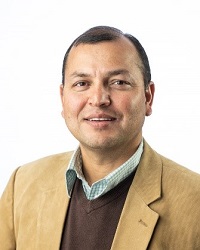
Dr. Mohan B. Dangi is an Associate Professor in the Department of Geography and City & Regional Planning at Fresno State. He received PhD and MS in Geography and Environmental Engineering from the Johns Hopkins University, MSc in Environmental Science and Engineering with high honors and BSc in Chemical and Petroleum Refining Engineering with minor in Asian Studies and International Politics from the Colorado School of Mines, and AS in Physical Sciences with Valedictorian from Central Wyoming College. He is a licensed Professional Engineer (PE) in the state of Colorado. He has over twenty years of industry-academia-government-international consulting experience. During his career at Fresno State, he has received prestigious Fulbright Specialist Award and DISCOVERe and eScholar fellowships as an Associate Professor and Coleman Fellowship as an Assistant Professor. As a student, he was awarded Francois Fiessinger Fellowship while at the Johns Hopkins University; Mahendra Vidya Bhushan Gold Medal from the King of Nepal, Phi Beta Delta National Student of the Year Award, and American Meteorological Society Fellowship during his study at the Colorado School of Mines; and Trio Award at Central Wyoming College. He has been instrumental in promoting educational ties between the US universities and Nepal’s largest and oldest (central) academic institution, Tribhuvan University thus inking eight memorandum of understanding.
Dr. Dangi has established himself as a passionate teacher-scholar as exhibited by high level of research in solid waste discipline for which he is internationally known. His teaching is guided by this research. Within just a few years after coming to Fresno State, he designed and delivered seven different courses for Fresno State and the University of Wyoming, including two study abroad curricula. Among the courses he developed, three of them have already been cataloged at Fresno State and they include: GEOG 129- Environmental Impact Assessment, GEOG 133- Environmental Policy Management, and GEOG 134- Introduction to Environmental Entrepreneurship.
Dr. Dangi’s students have received numerous awards at Fresno State and beyond. Some of them include Standard Bearer at the College of Social Sciences, Most Outstanding Student awards at the Department of Geography and City & Regional Planning, and Best Poster Presentation awards at regional and global conferences. The achievements and accolades his students have received over time is a single most driving factor for Dr. Dangi’s motivation to continue to teach at the highest level. This is also echoed by some of his students below:
“I have been honored to have completed three courses with Dr. Dangi, and they were among the best courses I have taken at CSUF [California State University, Fresno]. Geography 127, Global Environmental Change, was fascinating and I took a personal interest in working with Dr. Dangi on several problems contained within the course. Geography 128, Environmental Pollution was not only a follow-on to Geography 127, but a valuable precursor to my visit in Nepal and the work we did there for Geography 177T [Cultural Landscape and Environmental Change in the Himalayas], on the very issues described in G-128 [Geography 128]. In all of these, Dr. Dangi has been a leading light for all of us, inspiring us to do more than just pass the course. He has taught us to make these issues a vital part of our willingness to help solve the problems of society both here in the United States and in Nepal.” - Harold J. Gallagher, former student at Fresno State and current instructor at Reedley College.
“Dr. Dangi delivered his lectures on Basics of Solid Waste Engineering which is one of the fastest growing environmental problems in the cities of Nepal. The module and methods used by him during lectures were innovative, illustrative and easy to be grabbed by the students. I was fascinated by his skill to scientifically look at and raise the pertinent issue in the environment. Listening to his lecture delivery in class, I sometimes used to spare my time thinking he was born to be a teacher. Since his lecture, I began thinking the similar way and built my interest in solid waste, one of the major environmental issues, yet not looked upon with keen priority by scientific communities in Nepal… To sum up, Dr. Mohan B. Dangi is an extremely successful researcher who has already reached world-class prominence in the field of his expertise. He is also a conscientious human being and a gifted teacher.” - Saroj Adhikari, former student in Tribhuvan University, Nepal and current PhD student in Taiwan.
"The courses that I took at Fresno State that have had the most significant positive impact on my career were Environmental Pollution, and the Topics class on the National Environmental Policy Act (NEPA), both taught by Dr. Dangi. As I now work as California Environmental Quality Act (CEQA) practitioner, what I learned from Dr. Dangi in those classes has been directly relevant and applicable to my career. In fact, had I not chosen to take those classes, or had Dr. Dangi not been such an effective instructor, I would not have been qualified for my current, wonderful job. My personal success in my career over the last four years is directly attributable to my having taken classes from, and engaged in research with, Dr. Dangi.” - Nicole Hoke, former student and Associate Planner at ODELL Planning & Research, Inc.
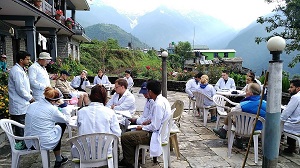
Dr. Dangi and his Nepalese colleague Dr. Basant Giri conduct experiential classroom for Fresno State students in the Himalayas.
Dr. Dangi, a Visiting Professor, both at the University of Wyoming and Tribhuvan University, Nepal, is always looking for ways to improve his pedagogy. As an eScholar at Fresno State, Dr. Dangi developed an online curriculum for his GEOG 128- Environmental Pollution course in 2017. As an upper division general education course, GEOG 128 has been very popular among students and especially with online delivery the course fills up quickly with students often in wait list. To upgrade and enhance online delivery, Dr. Dangi works very closely with University Instructional Designers (IDs) at Center for Faculty Excellence in Fresno State.
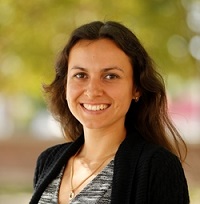
My story: My origin, childhood dreams, and their connection with the chosen field
I was born and raised in Ukraine. As a child, I was successful in and passionate for academics and sports. One of my greatest passions in childhood was mathematics. As a child, I participated in math competitions called the Math Olympiads and helped several of my classmates with mathematics homework. This informal tutoring of my friends led me to realize that I fully enjoyed teaching, and could contribute to society by teaching others. My other passion was Rhythmic Gymnastics, a sport that combines elements of ballet, gymnastics, dance, and apparatus manipulation, and is arguably the most beautiful sport in the world. I did Rhythmic Gymnastics for 11 years, participating in local, national, and international competitions and, as a result of my performance, earned the title of Master of Sports of Ukraine under the Unified Sports Classification of Ukraine. Interestingly, these two passions led to my current professional field and research interests, in which I emphasize cross-context connections as I examine people’s motivation and well-being from a holistic perspective with consideration of the multiple domains in their lives.
When the time came to pursue an undergraduate degree, I applied to a Pedagogical University to become a teacher, but I had to choose between two passions (mathematics and sports). I obtained a B.A. and Teaching Credentials in Physical Education, Choreography, and Health Studies. I also taught dance to 4-6-year old kids in a local private school of dance. These were very happy years and I look back with awe as the kids I taught are now grown up and are entering university. Yet, while I was feeling fulfilled in the physical aspect of my life, admittedly my life was lacking in the cognitive component. This led me to applying for the Fulbright scholar/student grant with the ultimate goal to becoming a professor at a university to continue teaching and being a contributing member of a society.
I completed my M.A. as a Fulbright scholar/student, and my Ph.D. in Educational Psychology, Cognition and Instruction, at the University of Connecticut with focus on Quantitative Research Methods. The focus on quantitative research methods was not my initial idea, but as I was proceeding with my Ph.D. degree in Educational Psychology, my childhood passion for mathematics re-sparkled in a form of deciding to take several additional classes in applied statistics. Notably, my dissertation focused on identity, achievement motivation, and ethical conduct of student-athletes, simultaneously focusing on two prominent contexts in which student-athletes live, strive, and achieve: academics and athletics, also reflecting my childhood passions for mathematics and rhythmic gymnastics.
Yet, my professional work has supported colleagues in various fields. For example, after I graduated from the University of Connecticut, I worked at the University of Illinois at Chicago teaching Research Design in Education graduate courses and providing methodological support on the Institute for Education Sciences Reading for Understanding research project, Project READI (Reading, Evidence, and Argumentation in Disciplinary Instruction). Funded by the Institute of Education Science (IES) in the amount of almost $20 million dollars, Project READI was a collaboration among the nation’s leading learning scientists, who were working to develop instructional interventions that support adolescent learners in developing reading for understanding in literary analysis, history, and science. I provided methodological support to Project READI’s variety of studies ranging from largely qualitative observation studies to mixed methods studies to largely quantitative studies.
I am now an Assistant Professor of Research and Statistics in the Department of Curriculum and Instruction, serving graduate students from diverse programs in the Kremen School of Education and Human Development. I am also currently pursuing my second M.A. degree in Sport Psychology from Fresno State to further enhance my research work.
What was the best moment of your career so far?
There have been many amazing highlights in my career so far involving teaching, research,
and service, but one of them stands out in a brighter light. In summer 2014, I was
contacted by the American Psychological Association (APA) Press with a request to
interview me for an upcoming press release featuring my recently accepted study entitled,
“The relationship between ethical and abusive coaching behaviors and student-athlete
well-being.” This study was done in collaboration with Michael Brown from the Pennsylvania
State University and with Thomas Paskus from the National Collegiate Athletic Association.
The APA press release led to a number of follow-up interviews with various media throughout
the country as well as some international exposure of my work. This collaborative
study also received the 2015 Outstanding Paper of the Year Award from the APA journal,
in which it was published.
What are your hobbies?
One of my greatest hobbies is traveling. I have been to a number of places in the
U.S. and to a number of countries. I absolutely love learning about new cultures,
because it allows for gaining new perspectives in life. While I used to travel with
friends or by myself, I now am being lucky to be able to share my travel passion with
my dear husband and our young, but growing, son.
What is your favorite thing about Fresno State?
When I first came to Fresno State, I immediately felt like I was at home. It is this
sense of a strong community, rich diversity of student population, and immense support
of faculty are my absolutely favorite things about Fresno State.
One teaching tip that I would like to share with my colleagues is that we must consider what skills and knowledge the students would need to become successful professionals, provide students with opportunities to share what they find the most beneficial and challenging, and then use this information to improve the courses in terms of their content and structure to serve students better.
The Center for Faculty Excellence (CFE) was central to better my teaching and engaging students for success. Because I frequently teach fully online courses, I took all available professional development and workshops offered by CFE, which helped me to redesign and greatly improve my online courses. In turn, students really appreciate the way I designed my online courses and deliver the contents. This has been particularly valuable because I teach what typically are known “difficult” courses (e.g., research, statistics, measurement, assessment, evaluation). However, with the help of CFE, I was able to create positive and enjoyable learning experiences for my students, as shown from the student testimonials below.
Feedback from students in online courses:
- I was really excited to enroll in this course as I've been working in the nonprofit sector for many years now, but had not had an academic foundation in program evaluation (my knowledge and skills in program evaluation were formed throughout my experience in the nonprofit sector). This course has been incredibly helpful and I've been connecting the dots between what I'm reading and the practical work I've done in this subject in my professional experience. Many, many "aha" moments.
- Dr. Yukhymenko is super helpful. It is apparent that she takes the content of the course seriously and tries to make it as interactive as possible by using videos, group conversations, and PowerPoints. We even had an online research workshop with a librarian. She grades things promptly and always provides constructive feedback. I appreciate having a professor like her here at Fresno State.
What are the 2-3 most important things that you have learned so far in this class?
- Educational research is extremely valuable and can done in our own classrooms to inform and impact our teaching practices.
- Finding reliable sources and being aware of the difference between method and methodology
- How to search for data and how to interpret the data I am reading about.
- The difference between qualitative and quantitative research and how to write a research paper appropriately.
- The research process is ongoing; it does not have to be so linear, like we sometimes believe.
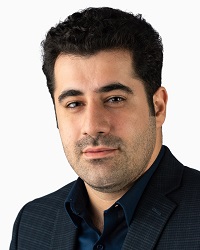
Dr. Shahab Tayeb, teaches engineering computations (ECE 71) and digital logic design (ECE 85). As a proud first-generation college graduate himself, he believes in changing lives through his teaching and he strives to make an impact in the community. He is confident that he will contribute to increasing the graduation and retention rates at Fresno State through his commitment to delivering a world-class education. He was recently an invited speaker for the Technology, Innovations, and Pedagogy (TIP) Conference themed “All Things Canvas”, where he delivered a talk discussing several strategies to promote student success using built-in functionalities of Canvas. The talk investigated activities that facilitate student-student and student-instructor interactions and analyzed the impact of such activities on student success in bottleneck engineering courses.
During his first year at Fresno State, Dr. Tayeb initiated the ECE Bulldog Hackathon where electrical and computer engineering undergraduate students work in teams to design, build, and test their hardware and software projects. He is also designing a new course on Cloud and Cybersecurity to train the next generation of cybersecurity professionals here at Fresno State.
He obtained his Ph.D. in Electrical Engineering from the University of Nevada, Las Vegas. Dr. Tayeb’s research expertise and interests include Embedded Networking and Cybersecurity, particularly in the contexts of the Internet of Things and Cyber-Physical Systems. He specializes in investigating attack mitigation techniques to safeguard connected devices and networks. He is currently working on applying data science techniques, particularly deep learning, to tackle the detection of zero-day attacks. He has also been part of multiple research projects on workforce development and professional development of K-12 teachers. He has authored/co-authored 20+ refereed research papers over the past three years and his research findings have been highlighted by the National Science Foundation. He has also been the recipient of several scholarships and awards including a US Congressional Commendation for STEM mentorship and a Graduate College medallion.
Dr. Tayeb has participated in a number of professional development opportunities, initiatives, certificate programs, and workshops offered by the Center for Faculty Excellence (CFE) and he regularly consults with the instructional designers there.
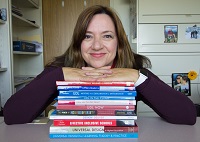
Did I ever think I was going to be a Professor, well no. Some days I look around and wonder how did I get here? For me I think it was a series of inspirational people. A few years ago and in a short time period I met a Police Chief, a Politician, and a Caterer, all dedicated and inspired leaders. Since I loved education, getting my PhD in education and becoming an educational leader seemed like a good move.
There were a few obstacles along the way.
One obstacle I used to perceive, as a weakness is my dyslexia. Although I have had a dyslexic brain since I was born, I am old enough that I did not know until I was in graduate school getting my teaching degree what dyslexia was. It was a comfort understanding that it was not that I wasn’t trying hard enough to spell, or read new material, but that my brain was just wired a bit differently. And as my daughter grew up dyslexic I was able to witness as a parent how special her brain was, and that being dyslexic could be a gift in how creative and interesting the world could be. What I did not realize until recently was how pervasive my self-doubt was due in part to being dyslexic. At a faculty meeting I recently mentioned I was dyslexic, no doubt because I had reversed something on a PowerPoint slide, or written down a phone number incorrectly. One of my colleagues rolled his eyes and said, “Oh I know, you say that all the time.” What I felt when he said that was shame. Later I got angry. I realized that my own self-perception had been shaped very much by what I could not do in my primary and secondary school years. I overcame a lot of difficulty because much of the education world told me I could not do it. I had to persevere in doubt anyway. And I am proud of that. I am dyslexic, and I plan on continuing to tell people.
Another obstacle is my anxiety disorder. Frustratingly I am most impacted during two tasks. One is giving speeches, most especially in front of peers, and the other is writing for peers. Since this is my profession I have needed to find ways to work with myself so I do not give up. One of the most effective tools I learned through the discipline of neuroscience. When the brain is nervous, like I am before and at the beginning of a speech, or at this very moment writing a piece for a journal, I become hot and uncomfortable. I can have trouble concentrating and organizing my thoughts, and I imagine I am loosing control of my physical body. Often I have trouble forming sentences, seeing clearly, and I always feel inadequate.
Neuroscience informs me that the same physical reactions also happen in my body when I am feeling excited. For example, when I get off the lift as I begin snow skiing down a trail, or getting on a horse I do not know. I love doing these things, and I get so excited! The trick is to trick my own brain and body. I say out loud, “I am excited” both when I am doing something fun, and when I am doing something anxiety producing. This helps, and the importance of neuroscience in UDL reassures me. Teaching, talking in front of large groups of smart people, and writing does excite me.
These are reasons I am obsessed with Universal Design for Learning. I want the students I teach here at Fresno State to embrace their obstacles and succeed, and UDL provides a framework for me to achieve this goal.
Universities, colleges, and other post-secondary institutions are acknowledging and embracing the increasing diversity within student bodies. Using the Universal Design for Learning lens to design and construct rigorous learning environments can increase the success of all students by providing every student a deeper connection to content and learning. As educators we can believe that every student voice is important, and the end has not been reached until every student has met the learning goal. This is not easy; it is worthwhile.
CFE has helped my teaching and student success by providing both a platform for me to explore inclusion in the University classroom, and tools to help me implement high expectations for my students at Fresno State.
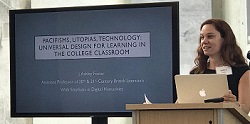
My name is Ashley Foster and I am Assistant Professor of 20th & 21st-Century British Literature with Emphasis in Digital Humanities in the Department of English. As a digital modernist, my research combines literary studies, digital humanities, peace studies, and women’s studies to analyze and curate archival documents and to trace relations between artistic and activist networks of the modernist era. I also focus on digital pedagogy and how critical usage of technology in the classroom can open new ways of thinking and learning.
This is my second year at Fresno State, and I have been very moved by the hospitality and warmth of the community. Born in New York, I attended Fordham University in the Bronx as an undergraduate and pursued my doctoral work at The Graduate Center, City University of New York, in Manhattan, where I had the opportunity to study under wonderful mentors. I completed my postdoctoral fellowship at Haverford College, where I had the honor of working with the Library to create a multi-modal special collections and digital humanities exhibition, Testimonies in Art & Action: Igniting Pacifism in the Face of Total War.
I am now continuing the work of curation and exhibition of archival materials here at Fresno State with our compelling and rich collections. The “Utopias: Literature, Technology, Archives” graduate seminar I am teaching this semester is working in collaboration with Tammy Lau and the Special Collections team in the Library to create a standing and digital exhibition on Utopias. We are right in the middle of choosing our exhibition items, discussing larger themes for the catalogue and labels, and building the website. This class is unique in that we are completely embedded in Special Collections; two hours a week we work in the collections, and we then discuss the literature assigned and inspiring and thought-provoking documents we have found. We are all very enthusiastic to see how the exhibition comes together. The opening will be in February of 2019.
When I am not researching or teaching, you can usually find me at the yoga studio or on a mountain trail. I have also recently started paddle boarding, which I love to do at Bass Lake, surrounded by the trees.
Flexibility and innovation are two foundations of my pedagogy.
The CFE has absolutely helped to better my teaching and learning, and has been an indispensable resource for my classes. Last semester, my graduate course "Literature and the Digital Humanities" were able to meet five distinguished members of the field via the conferencing technology Zoom because we were permitted to use the collaborative classroom. The CFE allowed us to set up early and test the technology systems in order to flawlessly host these digital talks. I am also a newly graduated member of the 2018 DiscoverE cohort, which will allow me to take new technologies and applications into my classroom this upcoming Spring.
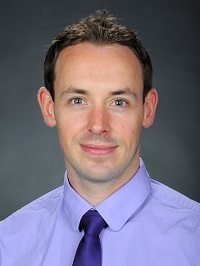
Dr. Dermot F. Donnelly is an Assistant Professor of Chemical Education at Fresno State, an Assistant Director of the Andrews STEM Education Center, and the President of the Untenured Faculty Organization. Dr. Donnelly joined Fresno State in Fall 2015.
Dr. Donnelly specializes in the role of instructional technologies to support enhanced student ownership and understanding of scientific concepts. Such instructional technologies include simulations, virtual laboratories, and online science learning environments. Other research interests include curriculum development and evaluation, professional development of teachers, and power dynamics in science classrooms.
Dr. Donnelly teaches physical science classes to elementary pre-service teachers (NSCI 1A), general chemistry classes to non-chemistry majors (Chem 3A), and laboratory teaching techniques to graduate students (Chem 201). Dr. Donnelly is also a Faculty Advisor to the Chemistry Club at Fresno State.
Dr. Donnelly, a native of Ireland, earned his B.Sc. in Physical Science Education and his Ph.D. in Chemical Education at the University of Limerick, Ireland. He spent a year as a postdoctoral researcher at Victoria University of Wellington, New Zealand and 3 years as a postdoctoral researcher at the University of California, Berkeley.
My teaching tip is to connect course concepts/ideas to everyday life as much as possible, whether through examples, talking to others at Fresno State, or reaching out to people in the community. The majority of students need to see the connection of concepts/ideas to their lives, their future careers, or how it can impact others in order to engage and appreciate their value.
The Center for Faculty Excellence has been and continues to be a terrific support for improving my teaching through several innovative professional development programs such as the DISCOVERe Mobile Technology Program, the Affordable Learning Solutions Program, and Project-Based Learning Program.
First, as a result of DISCOVERe, I now use several online platforms in class to support a learning environment where all students feel safe and comfortable to share their ideas with me on these platforms, whether right or wrong, without fear of being embarrassed in front of peers. Second, the Affordable Learning Solutions Program has supported me to identify and integrate free textbooks in my classes which can save each student on average over $100. Lastly, the Project-Based Learning Program has led to a collaboration with a local school where my class of future teachers can implement their own Science lessons in a real classroom.
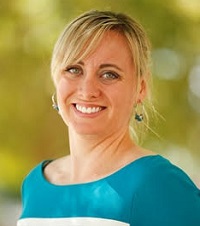
Dr. Sara Werner Juarez is an Assistant Professor of Special Education in the Literacy, Early, Bilingual, and Special Education (LEBSE) Department in the Kremen School of Education and Human Development. She teaches undergraduate, credential, and graduate courses in the liberal studies, multiple subject, single subject, and special education credential programs. Dr. Juarez earned a Ph.D. in Education, with an emphasis in Special Education at Claremont Graduate University and a M.S. in Special Education and credential to teach students with moderate to severe disabilities from CSU Long Beach. Previously, Dr. Juarez worked as a postdoctoral fellow with the IRIS Center, a federally funded center that provides free online resources for education professionals. Her research focuses on supporting teachers’ implementation of evidence-based and inclusive practices, especially to improve outcomes for students with moderate to severe intellectual disabilities and autism spectrum disorders.
Dr. Juarez grew up in Long Beach, California, where her mom was a life-long elementary school teacher and dad was a second-career middle school educator. Her brother became a teacher and then assistant principal, while her sister broke from family tradition and is a marriage and family therapist. Despite the lineage of educators, Dr. Juarez insisted she would choose a different field (her high school dream was to move to Costa Rica and take up zip-lining and sunbathing, after all). But after taking a gap year to explore Europe, she returned to Long Beach and became a substitute teacher, often teaching special education classes. It didn’t take long for her to find her passion for teaching students with significant learning needs, especially challenging behaviors. Dr. Juarez became an intern teacher for students with moderate to severe disabilities in 2006 and continued to teach for six years. She loved the challenge of meeting the individual academic, social, and behavioral needs of her students, as well as seeing the progress they made during their time in her classroom. Dr. Juarez was drawn to higher education through her desire to prepare future teachers.
The best moments of her career have always involved her students' progress, whether in the K-12 classroom or in her credential courses. There is no better feeling than seeing their improvement, like when one student progressed from sounding out letters to reading at a second grade level or another student spoke and had conversations for the first time after six years of being silent in school. At the higher education level, the best feedback is knowing students find coursework meaningful and relevant for their work in the classroom as they translate their knowledge into practice.
Dr. Juarez is married to her partner and BFF of almost 10 years, Benito, and has a toddler son, Lincoln (aka El Patron, aka the Boss Baby). They also share their home with Benito’s mother, Luz. They spend their free time playing outside, going to the park, and visiting family in Long Beach, LA, and San Francisco. They also hope to take advantage of Fresno’s proximity to Yosemite, Kings Canyon, and Sequoia as the weather warms up.
Her teaching tip for faculty is to be flexible with students, try new ways of teaching, and be bold as they challenge themselves to move away from traditional methods (lecture, tests, textbooks, etc.). Give students a variety of ways to access the course content, demonstrate their learning, and engage in the course, with you, and with their peers.
The Center for Faculty Excellence has been an outstanding resource for the university. Everyone is ready to support faculty in redesigning their courses to be more student-centered, transforming the experience for Fresno State students. DISCOVERe, Online Bootcamp, access to faculty learning communities, and online training have all contributed to my development as an educator, beyond my pedagogical training as a K-12 teacher. Making courses more accessible, whether face-to-face or online, has supported student learning and achievement. These initiatives are what contribute to making Fresno State a fantastic university that acts as a change agent for students, especially first-generation college students and those with non-traditional paths into and through the university system.
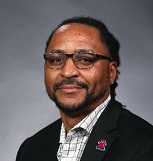
I am a proud first generation college graduate who grew to learn the value of education and the possibilities it affords. In my prior educational role, as a first grade teacher in Houston, Texas, I found so much joy and excitement in seeing how young minds worked as they developed an understanding of the content taught.
Here at Fresno State, I find that same level of enjoyment when our students rise to the occasion in my classroom. Whether that occurs in the form of developing more of their voice, (intellectual) identity, and/or self-confidence as a learner. More importantly, I see the significance of my students who seek to become future educators here in the Central Valley and beyond; because they will be the change agents and leaders for years to come.
We have some amazing students here at Fresno State and I feel it is my obligation to offer them my best as a curriculum designer and faculty member.
Educational background:
- Bachelor of Science, Prairie View A&M University
- Master of Education, University of Houston
- Master of Business Administration, University of Houston-Victoria
- Doctor of Philosophy (Education), University of Colorado-Boulder
- Honorary Doctor of Philosophy (Ethnic Studies), University of Colorado-Boulder
- Certified Teacher Education through 2021 (State of Texas): Elementary Biology Grades 1-8 & Elementary Self-Contained Grades 1-8
Research Interest:
- Teacher Education
- Africana Studies, particularly centered on identity and education
- Curriculum Development and Integration of Technology
- Social Theory
Patience is a key aspect of both teaching and learning. Patience can be kind and/or painful. It is kind when our patience pays off with the successes of our students in or outside of our classrooms. It can be painful when we see so much promise in our students or ourselves, yet it remains unachieved. I can recall many times that my younger self was the latter.
The entire CFE staff has been an invaluable resource to me as I have sought to challenge both myself and my students through my implementation of different forms of technology, which includes my use of Blackboard, Flipgrid, and iClicker REEF. My use of each of these applications has been enhanced by the feedback from staff here at CFE. While I could acknowledge the staff from Ms. Bennett, Ms. Blake, and others, I really want to thank all of the student staff (James, Ashley, Abbey, and Scott) that answer my phone calls and frequent visits. Those moments have been very beneficial to me and hopefully my students as well.
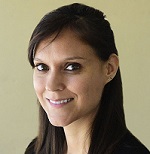
Amber earned her Ph.D. in Psychology from the University of California, Riverside in 2009. She joined Fresno State faculty in 2012 as an Assistant Professor. Her research area examines families and health. She is currently a co-Project Director on two USDA grants looking at obesity prevention, totaling $4.4 million dollars. This picture shows Dr. Hammons with her obesity prevention research team.
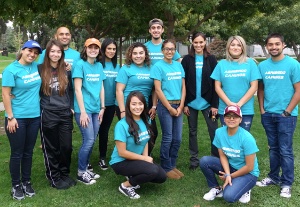
One of the most rewarding aspects of her work is getting students involved in research. She is the recipient of the Promising New Faculty Provost’s Award, the Jordan College of Agricultural Sciences and Technology Outstanding Research and Scholarly Award, and is a CSU Quality Online Learning and Teaching Awardee for Exemplary Teaching and Learning in Online Courses.
Where are you from? What was your childhood dream? What lead you to choose your field?
I grew up in a small town of 4,000 people in Arnold, California. In high school I
knew that after graduation I wanted to experience “big city life” and my dream cities
to live in were San Diego or Los Angeles. I started my freshman year at UCSD in 2004
as a pre-med biology major. As a teen I was inspired by the television show ER and
wanted to become a pediatric surgeon. After stumbling upon a developmental psychology
course at the end of my first year, I realized my true passion was in the field of
psychology and changed my major.
What has made the biggest impact on your career?
What I believe has made the biggest impact on my career is the relationships that
I have created, hands down. One of the areas in my life that I have been the luckiest
has been in having amazing mentors who offered indispensable advice and guidance.
One of my professors helped me to decide that developmental psychology was the right
path for me rather than the clinical route, and another mentor connected me to my
“celebrity” mentor who I was lucky enough to work with for three years before coming
to Fresno State. My mentors have greatly shaped my career trajectory and I hope I
can help my students in similar ways.
What was the best moment of your career so far?
Ironically, the best moment of my career so far stemmed from my worst moment. I missed
an important sign that something within my research program wasn’t working quite right.
As a result it risked the success of the project. However, this tested me in important
ways and opened up more opportunities than any other failure I have encountered. Ultimately,
with the help of my students, we were able to get the project not only back on track
but in a better place than it would have been originally. I learned more about myself
from this particular experience than any other single career experience and am grateful
for this failure.
What are your hobbies?
When I am not teaching or engaged in research, I am spending time with my two small
children and my husband. And I’m reading fiction.
What is one teaching tip that you would like to share with your colleagues or with
your younger self?
This is a hard one for me because there are so many things I would want to say to
my younger myself. Makes me wonder though if I knew then what I know now, would I
even be where I am today? With that in mind, I’d give myself the generic advice to
relax and enjoy that cup of tea--very few things are ever as serious as they seem.
Participating in CFE opportunities has definitely made me a better teacher, especially in my online courses. I learned so many things about technology and what’s available out there to optimize your online courses. My online courses have significantly changed for the better since I’ve implemented the best practices that I learned from the workshops. As a result I was a CSU Quality Online Learning and Teaching Awardee for Exemplary Teaching and Learning in Online Courses, an honor that I am very proud of. If I had more time I would take advantage of every CFE opportunity. I can honestly say that I have walked away from each workshop with a new skill or understanding of something.

Dr. Miguel A. Perez is a health educator whose work focuses on cultural competence and global health issues among adolescents. His collaborative work with colleagues at both Fresno State and other institutions has resulted in one textbook, two co-edited textbooks, about 15 book chapters, and over 50 peer-reviewed publications as well as numerous presentations (peer reviewed and invited) at local, state, national, and international conferences. Since arriving at Fresno State in 1999, Dr. Perez has received four Fulbright awards and has taught as well as conducted research in several Latin America, Africa, and Asia countries. His work has also earned him two honorary professorships, one at the Universidad Central del Este in the Dominican Republic and one at the Universidad Ricardo Palma in Peru.
Dr. Perez credits his desire for scientific inquiry to the lessons learned in his
early childhood. As a child, he was a voracious reader, a skill facilitated by reading
the daily newspaper to his illiterate father. As any “good” child he tried to get
away with taking short cuts in doing homework figuring that his mother who had a third
grade education would not know the difference, to this day he is uncertain as to how,
but she always knew when he was being less than truthful with her. Those early lessons
provide the foundation for his life-long quest for expanding his horizons and have
served him well in his academic career. It is with a hint of nostalgia that he says
“Thanks mom and dad for instilling such a good work ethic in me.”
Despite his desire for learning, Dr. Perez never considered an academic career until
his junior year in college. Limited funds and a lack of familiarity with the higher
education system were two of the biggest barriers to consider such a lofty goal; however,
thanks to extraordinary mentorship by a number of people who hold a special place
in his heart, Dr. Perez was able to achieve something that once seemed outside this
reach. “Receiving my Ph.D., surrounded by family and friends was a humbling experience,”
said Dr. Perez, “words will never fully express the depth of my gratitude especially
to my sister Betty.”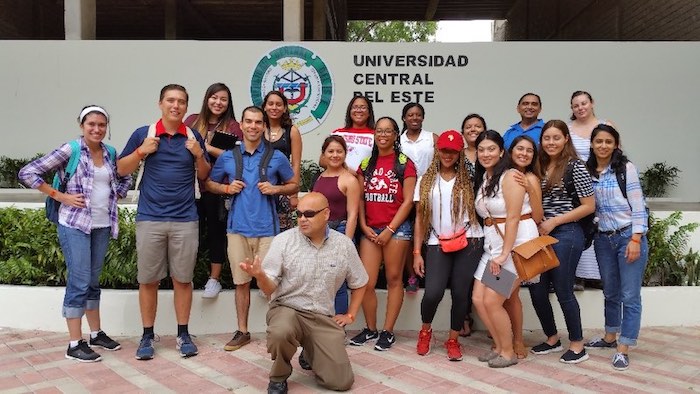
Dr. Perez has enjoyed mentoring students over the years at Fresno State. From his
early days as faculty liaison to the Health Careers Opportunity Program to his current
service learning class in the Dominican Republic he has strived to pay forward what
he received as a student. He is proud of his students and challenges them to overcome
the many obstacles they face in their lives. He is particularly proud of those students
who despite obstacles achieve their academic careers and chose to seek graduate level
education, with many obtaining masters’ level degrees and three of them now holding
doctoral degrees and working as faculty members.
In addition to his work in the classroom, Dr. Perez has provided his time and expertise
to many professional and local organizations. In 2008, he was appointed by the State
Superintendent of Education to the panel that drafted the Health Education Standards
for grades K-12 in the State of California. In 2017, he was appointed by the Department
of Education to the panel drafting the Health Education Framework for the State of
California. These two documents provide the foundation for health education content
in K-12 in the State.
Dr. Perez has received over 40 awards for his professional accomplishments and for
his work with students. Notably among them, in 2009 Dr. Perez received both the Professional
Service Award from the American Association of Health Educators and a Certificate
of Recognition for Distinguished Accomplishments from the Hispanic Association of
Colleges and Universities. In 2013 he received the Faculty Mentor Award from the College
of Health and Human Services at Fresno State, and in 2015, Dr. Perez received the
Corazón “Heart” Award for his work with Latino community health workers from Vision
y Compromiso.
Reflecting on his years as a teacher, Dr. Perez advises his former self to “never miss an opportunity to listen to others, those few minutes of your life can be life altering to them.” He advises himself and others to learn from their mistakes and to never be afraid to try new things, “you never know what new doors of opportunity will be opened.”
In his continuing quest for improving his pedagogical skills, Dr. Perez has participated in a number of programs designed to expand his teaching toolbox. By far the most important tools obtained in that process have been the trainings provided by the Center for Faculty Excellence and its predecessors here at Fresno State. His teaching has improved through myriad trainings offered by CFE and his participation in the DISCOVERe program has provided skills he uses in the classroom on a daily basis. CFE has also been a good place to interact with like-minded individuals, expand horizons, and meet the best Instructional Designers in the business.
Dr. Perez earned his bachelor’s degree in research in Mental Health at California State University, Dominguez Hills and his Master’s Degree and Ph.D. in health education at the Pennsylvania State University. He is blessed to count on the support of his loving wife Helda, also a faculty member at Fresno State, and their marvelous children.
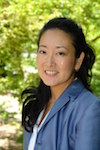
Joy was born and raised in Fresno, California. She earned a B.S. in Chemistry from UC Davis and her Ph.D. in Chemistry from UCLA. She is the recipient of the UCLA Alumni Association distinguished dissertation year award and a Collegium of University Teaching fellowship. She was a John Douglas French Alzheimer’s Foundation research fellow at Harvard Medical School and a Beckman Senior Research Fellow in the Neurosciences Division at the City of Hope.
She has mentored and trained 40 undergraduates and 15 graduate students in her research laboratory. She has co-authored 10 peer-reviewed publications, including seven with her students. Many of these students have gone on to work in the biotech industry, and to attend Ph.D. programs, or medical, dental or pharmacy school. Dr. Goto uses her training in bioinorganic chemistry and neuroscience to contribute to the understanding of neurodegenerative diseases, oxidative stress and metal homeostasis. Her research is supported by University and College grants, including co-authored grants from the NIH, NSF, USDA, and private foundations totaling ~$3.5 million.
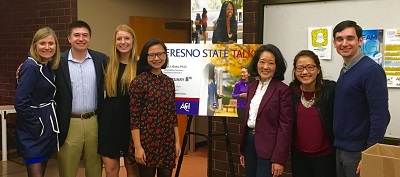
She was awarded the 2016 Fresno State Women’s Association Faculty Leadership Award and was a 2017 Fresno State Talks – Discovery speaker, by student nomination. She has served on the President’s Commission on Human Relations and Equity (PCHRE) and is a Fresno State representative for the CSU Asian American and Pacific Islander Initiative.
What was your childhood dream? My childhood dream was to become a ballerina/gymnast/ice-skater, a pharmacist, or a veterinarian. Ultimately, my dream in college was to become a scientist and to explore and attempt to solve complex problems in health and human disease; I also wanted to travel the world.
What lead you to choose your field and what has made the biggest impact on my career? I always had teachers and mentors that encouraged and challenged me, and this lead to the self-realization that I was capable of achieving more than I thought I was capable of achieving. Teachers and my parents and two big brothers taught me to strive. They really had a strong ethos of education that inspired me to want to stay in academia, especially where I could balance teaching, research and service (not all at once but throughout my career). A university campus is vibrant, constantly changing and growing, and is an environment that I love to be in especially because I love learning and I truly enjoy teaching and mentoring students.
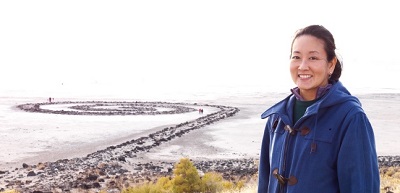
I became a chemist because I initially loved watching how you could see a chemical reaction (e.g. rust precipitating on a nail, baking soda and vinegar making a penny shine, fireworks colors) and how I could learn how to control something that initially seemed like a spontaneous phenomenon. There are principles in chemistry that guide how reactions and especially those in biochemistry can move forward. I just had so much fun with learning how to set-up experiments, how to tinker and troubleshoot, and how I could talk to other scientists at scientific meetings all over the world. All of these experiences eventually converged in wanting to become a scientist/faculty at an academic institution.
What is your favorite thing about Fresno State? I love the spirit of our campus and especially the students, faculty and staff in my home Department of Chemistry.
What is one teaching tip you would like to share with your colleagues or your younger
self?
The one tip: Design activities to teach students how to learn and to develop complex
critical thinking skills (i.e. don’t be the sage on the stage, but the guide on the
side).
When I was a first year graduate student I was a teaching associate (TA) to 25-30 eager first-year UCLA science undergraduates taking their first general chemistry course. I did every single problem in the textbook to make sure I was prepared to teach the course. This extra work helped build my confidence to stand up in front of a group of eager students during a one-hour discussion section. The take home lesson is that while I was prepared to answer questions, this format did nothing to actually prepare the students how to hone their own skills solving problems or more importantly, developing and thinking on their own. It was good that I had literally done my homework, but I now realize that teaching is a process for the instructor just as much as it is for the students.
How has the Center for Faculty Excellence (CFE) helped to better your teaching and
learning to engage students for success?
I have attended seminars and workshops since my first years as a tenure-track faculty
and still do. My understanding of pedagogy, scientific pedagogy has grown and developed
and my natural tendency to be a life-long learner of teaching is sated. I have participated
in FLCs, DISCOVERe, eScholar and a majority of the professional development (PD) opportunities
offered by the CFE, and I will continue to participate.
The CFE has also been a great place to converse, gain support, and learn from fellow faculty and staff in all areas of our campus. I want to thank our CFE Instructional Designers (ID): Sue Yang, Mary Bennett, and JoLynne Blake; they are some of the best instructors on campus. They have made significant contributions to facilitating my learning environment in the CFE, as a faculty-student in the various workshops and PD opportunities throughout my time at Fresno State.
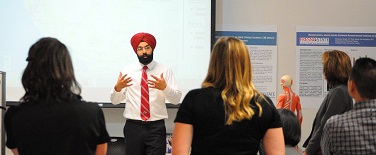
I am originally from Amritsar, India, where I first studied physical therapy. I came to the United States for my PhD in Physical Rehabilitation Sciences from the University of Iowa where I focused my research agenda on gait and biomechanics. I specialize in looking at the relationships between obesity and gait in children and adults. At Fresno State, I teach in the Doctor of Physical Therapy Program, and oversee the Gait Analysis Movement Evaluation (GAME) lab. I have been recognized as a Promising New Faculty, Outstanding Student Advisor and was recently awarded early tenure. While I always saw myself as a clinical researcher first, my students have opened my eyes to the joys of the classroom - I strive to help physical therapy students around the world become excellent scholars and practitioners. Fresno State gives me the unique opportunity to maintain a blend of high quality research and teaching diverse students.
Some of my greatest successes have been the result of looking for non-traditional solutions to problems. That is true in life as well as in academia; if a problem is impossible, look for ways to work around the problem.
The Center for Faculty Excellence (CFE) has been a great resource for me. I was a participant of multiple CFE initiatives and workshops. I was a DISCOVERe participant a few years back and now facilitate the DISCOVERe program as a faculty lead in the summer session. The program helps me in improving my pedagogy and gives me an opportunity to share my knowledge and skills with the greater Fresno State community. I see the importance of technology in my lab and in my classroom, and strongly support the initiative to expose students to various forms of learning and engaging with their academic material.
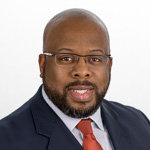
Assistant Professor Dr. Keith Story is the Kessler and Lewis Research Fellow of Marketing and Logistics at California State University, Fresno and joined the Craig School Faculty in the fall of 2015. He received his PhD from the University of Memphis. His research interests include business-to-business marketing, marketing strategy, and the marketing-supply chain interface. Dr. Story’s current research looks at the ability of firms to recognize and act on innovation opportunities as a strategic resource, and how that resource can be used as a competitive advantage. He is a Southern Regional Education Board (SREB) Fellow and was awarded a fellowship for his doctoral studies from the Intermodal Freight Transportation Institute at the University of Memphis. Prior to his academic career, Dr. Story worked in supply chain and marketing roles for leading companies such as Alcoa, Johnson and Johnson, Deloitte Consulting, and Accredo. His professional responsibilities spanned several areas of marketing and supply chain, including brand management, product management, inventory management, and operations improvement. Dr. Story is a graduate of the Industrial Engineering program of the University of Tennessee, Knoxville and has an MBA from Cornell University.
He teaches Supply Chain Logistics (MKTG 114), Global Logistics (MKTG 115), and Purchasing and Materials Management (MKTG 126) as part of the Logistics option. We’ve asked Dr. Story a few questions to get to know him better:
Where are you from? I am a native of Memphis, Tennessee but I have lived in several parts of the country. Ithaca, NY, Knoxville, TN, and Bettendorf, IA are some of the places that have shaped my view of the world. It’s made me appreciate how big and diverse the country is not only demographically, but geographically as well.
How did you select your college major? I always knew that I wanted to be involved with technology and science and business. I just didn’t know what particular field I would take up. I decided that Industrial Engineering was the best fit because it seemed to be the most flexible of the engineering disciplines, and it requires that you work with people. Many of the other disciplines seemed to be focused on solitary design work at a desk, while the IEs were in the plant learning about machines, talking to workers, designing new systems, implementing plans, etc. The major requires a broad knowledge of engineering, systems, manufacturing, and business areas, all of which, I thought, would give me a great deal of flexibility and many options when I graduated from undergraduate school. It paid off – I began working for a management consulting firm leveraging my IE training and work experience to assist firms with implementing just-in-time processes in their facilities.
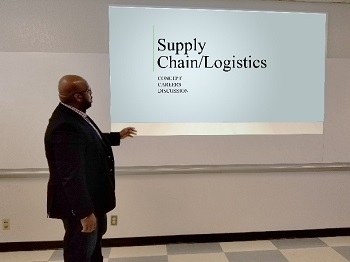
What would you tell students interested in the Logistics option? I believe supply chain/logistics to be the backbone of business. Every company is involved in this area in some way, and students will be more competitive if they add knowledge in this area to their toolkit. During my time in corporate America, having knowledge about the SCM/L part of a business gave me a distinct competitive advantage versus my peers. Understanding of the language, challenges, and the objectives of the supply chain allowed me to make unique contributions to work efforts and made me a great candidate for roles that involved leading cross-functional teams and projects. Also, having SCM/L knowledge allowed me to work on both the commercial and operational side of business, a key set of experiences for those looking to navigate the corporate ladder.
What was the biggest influence in your selection of career pathway? My intern experiences were instrumental in helping me determine what path to walk with respect to my career. I thoroughly enjoyed my work experiences and learned a lot! It did however, let me know what I did not want to do. I did not want a traditional engineering job at a plant that seemed limited in its scope and limited in the exposure I could get to new things or areas of the business. I decided to have a career that contained continuous learning and exposure to a variety of business problems and business functions. This idea of continual learning and growth led me to eventually pursue an MBA and finally a PhD.
What attracted you to academia? I think a few things attracted me to this career. The continuing theme of being in a learning environment, being connected to the latest business thinking, being able to contribute to the knowledge that fuels the next generation of business leaders, and being able to give back are all elements of this profession that I like. This job is a lot of work. But, it is intellectually stimulating, professionally satisfying, and personally rewarding. How can one pass that up?
What is your favorite aspect of your job? I believe that the pathway to prosperity is through education. Being in a job where I can live that mantra every day and help others realize their dreams (in my small way) is kinda cool.
If you could go back to undergraduate school and select any elective course to take that would have better prepared you for the future, what would it be? Computer programming. I wish I could code. And English composition. It’s way more important than they tell you in undergrad…
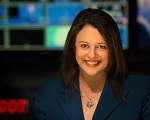 Faith Sidlow came to Fresno in 1985 for a job in television news at KSEE24. For the
next 28 years she did everything from working on the assignment desk and producing
newscasts to serving as a consumer reporter and weather forecaster. She covered fires,
earthquakes, politics and crime and received several awards for her reporting. Her
favorite assignments were stories about everyday people. One of her most memorable
experiences was a series of reports called "Extreme Faith," where she tried adventurous
activities and then highlighted the people who excelled at those sports. She fondly
remembers a hike to Half Dome in Yosemite with a string quartet. The hikers hauled
their instruments to the top of the monolith and performed a concert there. It was
breathtaking and beautiful. Faith spent the last 17 years of her TV career as a morning
anchor, starting on the air at 4:30 a.m.
Faith Sidlow came to Fresno in 1985 for a job in television news at KSEE24. For the
next 28 years she did everything from working on the assignment desk and producing
newscasts to serving as a consumer reporter and weather forecaster. She covered fires,
earthquakes, politics and crime and received several awards for her reporting. Her
favorite assignments were stories about everyday people. One of her most memorable
experiences was a series of reports called "Extreme Faith," where she tried adventurous
activities and then highlighted the people who excelled at those sports. She fondly
remembers a hike to Half Dome in Yosemite with a string quartet. The hikers hauled
their instruments to the top of the monolith and performed a concert there. It was
breathtaking and beautiful. Faith spent the last 17 years of her TV career as a morning
anchor, starting on the air at 4:30 a.m.
In 2005, Faith decided to do more with journalism. She wanted to teach up-and-coming journalists the importance of responsible news coverage, strong ethics, and the art of storytelling. She enrolled in the Mass Communication and Journalism master's degree program at Fresno State and graduated with distinction in 2008. She began teaching as an adjunct instructor at both Fresno City College and Fresno State while continuing to anchor the morning show. In 2015 the Department of Mass Communication and Journalism hired her as a full-time tenure-track professor.
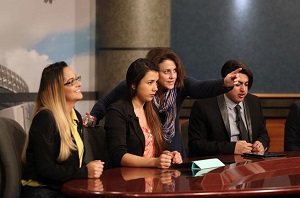
Faith is most proud of her students who produce and report for Fresno State Focus, the weekly television newscast that broadcasts live from the MCJ TV studio in the Speech Arts building. Their reports and newscasts have won awards from the Associated Press, Radio and Television Digital News Association, Broadcast Education Association, and the Intercollegiate Broadcasting System. Nearly all of her students who want jobs in television or radio news have found jobs--in Wyoming, Montana, New York, Oregon, Washington, Arizona, Florida, Nevada, and California, to name a few.
Faith has enjoyed the tenure process, especially because it has allowed her to get back to storytelling. She recently won a Golden Mike Award for a radio report on the Central Valley Honor Flight--a piece that also won second place from the Broadcast Education Association. Right now she is wrapping up a long format story on homeless students, and she's collaborating on research with faculty in her department and abroad. For the past three years, Faith and her students have hosted the Global News Relay, a collaboration among students and faculty around the world. Their most recent GNR involved students at 17 universities in 10 countries who reported on stories with a Solutions Journalism theme.
In addition to teaching and scholarship, Faith is committed to ensuring that our students are engaged in high impact practices such as digital technology. She attends workshops and conferences to learn how to apply technology to teaching and learning in keeping with President Castro's strategic plan. Her goal is to make digital tools available to all Fresno State students at a low cost to give them a competitive edge and expand their opportunities in the technology workforce.
Faith has been married to her husband Bob, an OB-Gyn, since 2004. Between them, they have four adult children--her youngest just started graduate school in Oregon, and the second youngest is finishing her graduate degree in Southern California. The second youngest son works for Google and the oldest is in food service at Clovis Unified. Faith and Bob share their "empty nest" with Oscar and Riley, a chocolate lab and golden retriever, who can always be counted on to entertain.